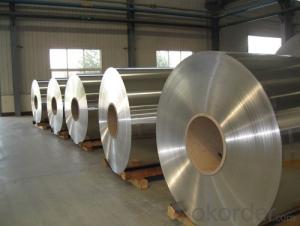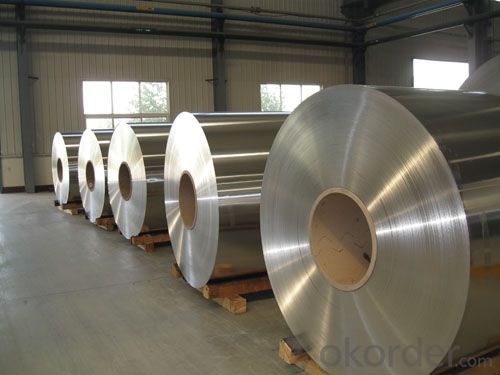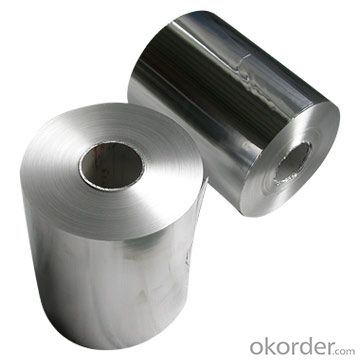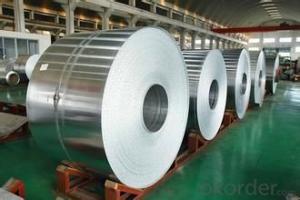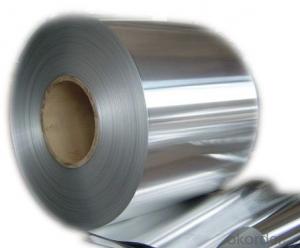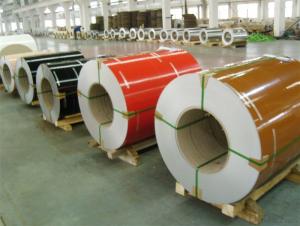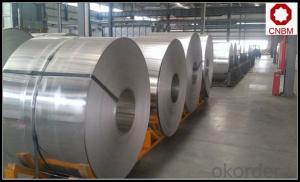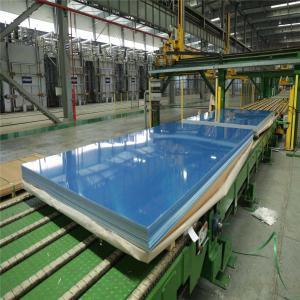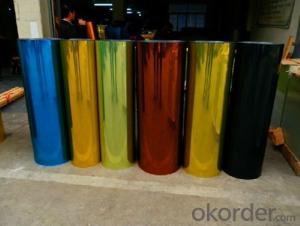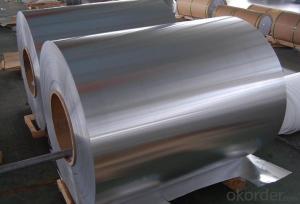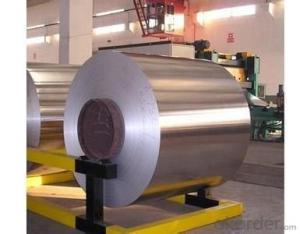Mill Finish Aluminum Sheet Coil - Alloy 1050, 1060, 1100
- Loading Port:
- Shanghai
- Payment Terms:
- TT OR LC
- Min Order Qty:
- 5 m.t.
- Supply Capability:
- 5000 m.t./month
OKorder Service Pledge
OKorder Financial Service
You Might Also Like
Specification
Mill Finish Aluminum Sheet And Plate Alloy 1050 1060 1100
Packaging & Delivery
| Packaging Details: | Standard seaworthy packages in bundles or as per requirement. Container size: The inner size of container is below: 20ft GP: 5.8m(length) x 2.13m(width) x 2.18m(high) about 24-26CBM 4 0ft GP: 11.8m(length) x 2.13m(width) x 2.18m(high) about 54CBM 40ft HG: 11.8m(length) x 2.13m(width) x 2.72m(high) about 68CBM(stainless steel seamless pipe) |
| Delivery Detail: | Within 5-15 days after deposit(price of aluminum coil) |
Our Services
1. Provide products with high quality and reasonable price
2. The first time back to you
3. Perfect after-sale service
4. Small order is acceptable
5. OEM is acceptable
6. 12Months quality guarantee
7. Any third party testing is acceptable
Product Description
| Product Name | Prices of aluminum coil |
| Standard | JIS, AISI, ASTM, GB, DIN |
| Alloy | Yes |
| Width | 720-1250mm or as the customers' requirements |
| Length | 10000-12000mm mm or as the customers' requirements |
| Thickness | 0.12-1.5mm |
| Surface | Black painted,PE coated,GL,color coated,etc |
| Item | steel plate,steel sheet,alloy plate,alloy sheet |
| Application | construction field, ships building industry, petroleum & chemical industries, war and electricity industries, food processing and medical industry, boiler heat exchanger, machinery and hardware fields ,etc. |
| Packing | Export standard or as customers' requirement |
| Delivery time | Within 7 working days, according to customers' quantities |
| Payment | L/C or T/T or as customers' requirement |
| MOQ | 1 Ton |
| Quality | High Quality. We can Provide SGS inspection if you need . |
| Productivity | 60000 Tons/Month |
| Attention | We will supply you good quality and bottom price and first-class service in china and hope to be your golden supplier |
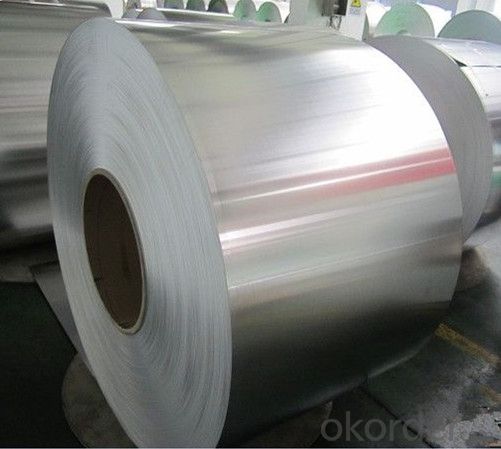
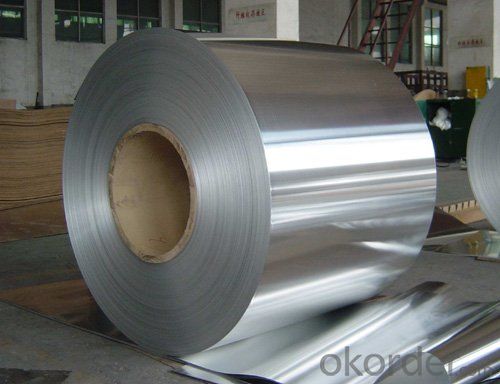
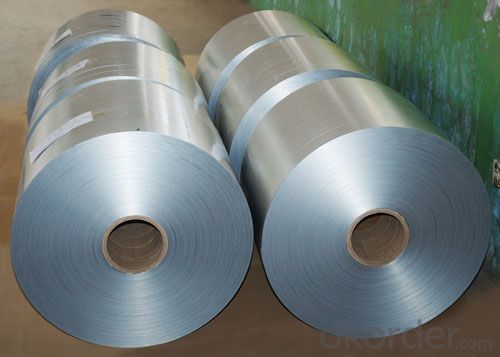
- Q: Can aluminum coils be used in the production of aluminum composite ceilings?
- Yes, aluminum coils can be used in the production of aluminum composite ceilings. Aluminum coils are often used as the base material for manufacturing aluminum composite panels, which are then used to create ceilings. These coils are typically made of high-quality aluminum alloy and have undergone various processes to ensure their strength, durability, and aesthetic appearance. The aluminum coils are coated with a protective layer, such as PVDF or polyester, to enhance their resistance to weathering, UV rays, and corrosion. This coating also allows for a wide range of color options, providing flexibility in design choices for aluminum composite ceilings. Overall, aluminum coils are an essential component in the production of aluminum composite ceilings, offering a lightweight, fire-resistant, and long-lasting solution for various architectural and interior design applications.
- Q: when ferrous sulfate is poured into an aluminium can, holes appear in the can. Why?
- aluminum reacts via a redox reaction with iron(II): 3 Fe2+(aq) + 2 Al(s) --- 3 Fe(s) + 2 Al3+(aq)
- Q: What are the different packaging weights available for aluminum coils?
- The different packaging weights available for aluminum coils vary depending on the specific requirements and applications. Common packaging weights for aluminum coils range from 1,000 to 10,000 pounds or more. These weights can be customized to meet the needs of different industries and transportation methods.
- Q: Are aluminum coils suitable for cryogenic applications?
- Yes, aluminum coils are suitable for cryogenic applications. Aluminum has a number of properties that make it an excellent choice for use in low-temperature environments. Firstly, aluminum has a low melting point, which means it remains solid and maintains its structural integrity at cryogenic temperatures. This is crucial for applications where extreme cold temperatures are involved, such as in cryogenic storage or transportation. Additionally, aluminum has good thermal conductivity, which allows for efficient heat transfer. In cryogenic applications, it is important to manage and control heat flow to prevent temperature fluctuations or thermal stress. Aluminum coils can effectively transfer heat away from the system, ensuring stable and consistent temperatures. Furthermore, aluminum is lightweight and has a high strength-to-weight ratio. This makes it highly advantageous for cryogenic applications, where weight and space considerations are often critical. Aluminum coils can help reduce the overall weight of the system, making it more efficient and cost-effective. Lastly, aluminum is corrosion-resistant, which is essential in cryogenic environments where moisture or other corrosive substances may be present. Aluminum coils can withstand the harsh conditions and maintain their performance and durability over extended periods of time. Overall, due to its low melting point, good thermal conductivity, lightweight nature, and corrosion resistance, aluminum coils are indeed suitable for cryogenic applications. They offer numerous benefits and can effectively meet the requirements of such demanding environments.
- Q: Explain how aluminum coils are connected to electronics.
- <p>Aluminum coils play a significant role in the electronics industry due to their high electrical conductivity and low density. They are used in various components such as transformers, inductors, and chokes, where they help in the conversion and regulation of electrical energy. Aluminum's non-magnetic properties make it ideal for parts that need to be shielded from magnetic fields. Additionally, aluminum coils are used in heat sinks to dissipate heat generated by electronic devices, ensuring their efficient operation and longevity.</p>
- Q: Are aluminum coils suitable for coil coating applications?
- Indeed, coil coating applications find aluminum coils to be a suitable option. Aluminum, owing to its outstanding resistance to corrosion, lightweight composition, and impressive strength-to-weight ratio, enjoys extensive usage in coil coating. Moreover, its high malleability facilitates effortless shaping and molding throughout the coil coating procedure. Furthermore, aluminum coils can be coated with an array of paints and coatings, offering a diverse selection of colors and finishes. To sum up, aluminum coils are a favored preference for coil coating applications due to their adaptability, longevity, and visually pleasing attributes.
- Q: i know aluminum nitrate will dissociate, and also that there is no way that the nitrate will react to make the solution basic or neutral. But what about the aluminum ion? Does it take OH- from water to make [Al(OH)4]- and make the solution acidic? Does it somehow take protons and make a basic solution? My teacher said its not neutral, so I'm leaning towards an acidic solution. Thanks!
- Aluminum nitrate is the salt produced by the reaction of aluminum hydroxide and nitric acid. Nitric acid is a strong acid. Aluminum hydroxide is a realtively weak base. So the salt will be acidic.
- Q: This question asks about the impact of aluminum coils on cooking equipment, including their role in heat distribution and potential benefits or drawbacks.
- <p>Aluminum coils in cooking equipment play a significant role in heat distribution and retention. They are known for their excellent thermal conductivity, which allows for even heat distribution across the cooking surface, reducing hot spots and ensuring consistent cooking results. Aluminum's lightweight and malleability also make it easy to shape into various forms, fitting different types of cookware. However, aluminum can react with acidic foods, potentially altering the taste or releasing small amounts of aluminum into the food, which some studies suggest could have health implications. Additionally, aluminum cookware requires careful handling to avoid scratches that can compromise its performance and appearance.</p>
- Q: Can aluminum coils be used in electrical busbars?
- Yes, aluminum coils can be used in electrical busbars. Aluminum offers good conductivity, is lightweight, and cost-effective, making it suitable for use in busbars. However, proper insulation and connection techniques must be employed to address the higher thermal expansion and potential corrosion issues associated with aluminum.
- Q: How are aluminum coils stored and transported?
- Aluminum coils are typically stored and transported in a way that ensures their safety and minimizes damage. These coils are usually stored in a warehouse or storage facility, where they are protected from the elements and other potential hazards. The coils are often neatly stacked in a secure manner, with appropriate padding or spacers to prevent any movement or potential damage. When it comes to transportation, aluminum coils are usually transported using flatbed trucks or shipping containers. These vehicles are equipped with secure tie-downs and restraints to prevent any shifting or damage during transit. It is important to ensure that the coils are properly secured to prevent any accidents or mishaps. Additionally, some precautions are taken during transportation to protect the aluminum coils from any potential damage. For instance, the coils may be covered with protective materials, such as plastic or fabric, to prevent scratches or dents. In some cases, the coils may also be wrapped with stretch film or strapped with bands to provide additional protection. Overall, the storage and transportation of aluminum coils require careful handling and adherence to safety protocols. This ensures that the coils remain in optimal condition and are delivered to their destination without any issues.
Send your message to us
Mill Finish Aluminum Sheet Coil - Alloy 1050, 1060, 1100
- Loading Port:
- Shanghai
- Payment Terms:
- TT OR LC
- Min Order Qty:
- 5 m.t.
- Supply Capability:
- 5000 m.t./month
OKorder Service Pledge
OKorder Financial Service
Similar products
Hot products
Hot Searches
Related keywords
